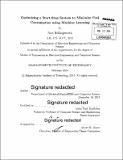Optimizing a start-stop system to minimize fuel consumption using machine learning
Author(s)
Hollingsworth, Noel
DownloadFull printable version (3.955Mb)
Other Contributors
Massachusetts Institute of Technology. Department of Electrical Engineering and Computer Science.
Advisor
Leslie Pack Kaelbling.
Terms of use
Metadata
Show full item recordAbstract
Many people are working on improving the efficiency of car's engines. One approach to maximizing efficiency has been to create start-stop systems. These systems shut the car's engine off when the car comes to a stop, saving fuel that would be used to keep the engine running. However, these systems introduce additional energy costs, which are associated with the engine restarting. These energy costs must be balanced by the system. In this thesis I describe my work with Ford to improve the performance of their start-stop controller. In this thesis I discuss optimizing a controller for both the general population as well as for individual drivers. I use reinforcement-learning techniques in both cases to find the best performing controller. I find a 27% improvement on Ford's current controller when optimizing for the general population, and then find an additional 1.6% improvement on the improved controller when optimizing for an individual.
Description
Thesis: M. Eng., Massachusetts Institute of Technology, Department of Electrical Engineering and Computer Science, 2014. Cataloged from PDF version of thesis. Includes bibliographical references (pages 74-75).
Date issued
2014Department
Massachusetts Institute of Technology. Department of Electrical Engineering and Computer SciencePublisher
Massachusetts Institute of Technology
Keywords
Electrical Engineering and Computer Science.